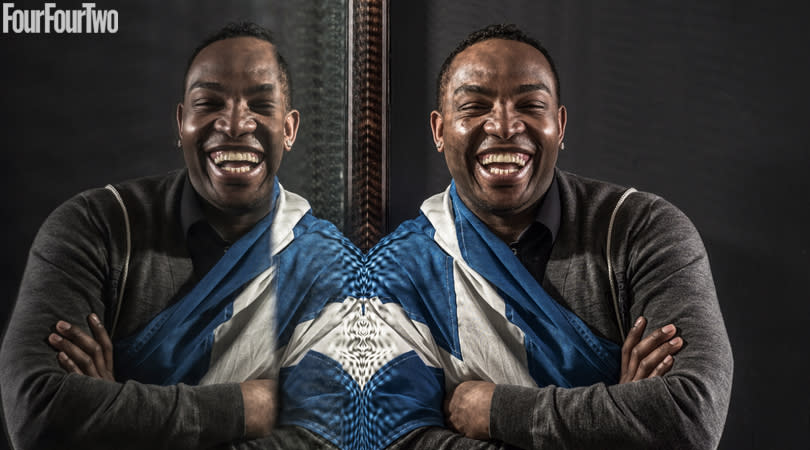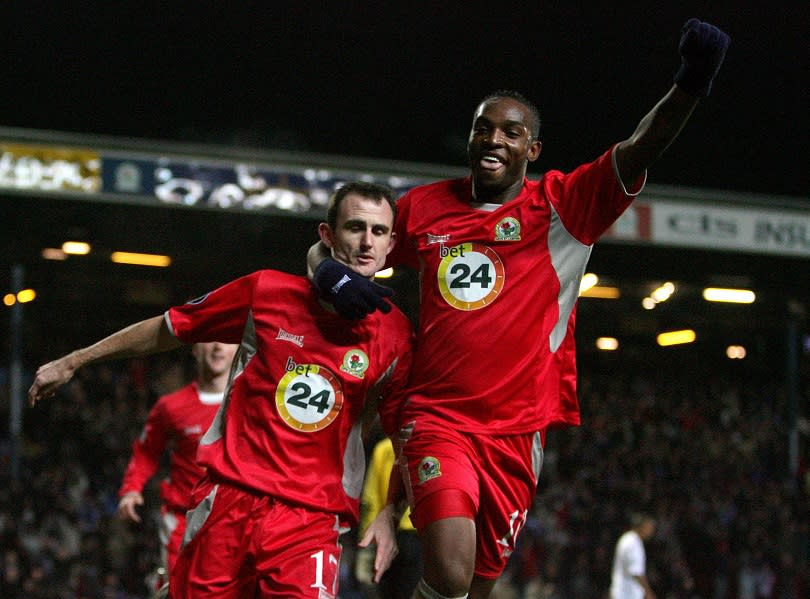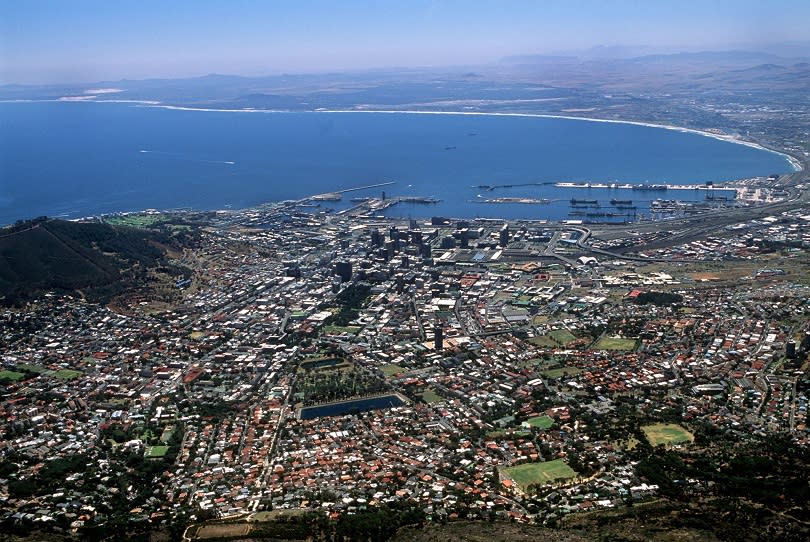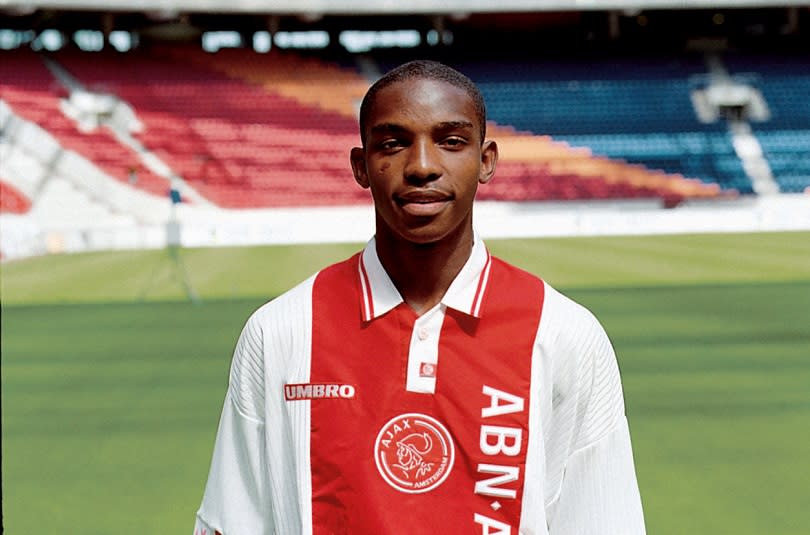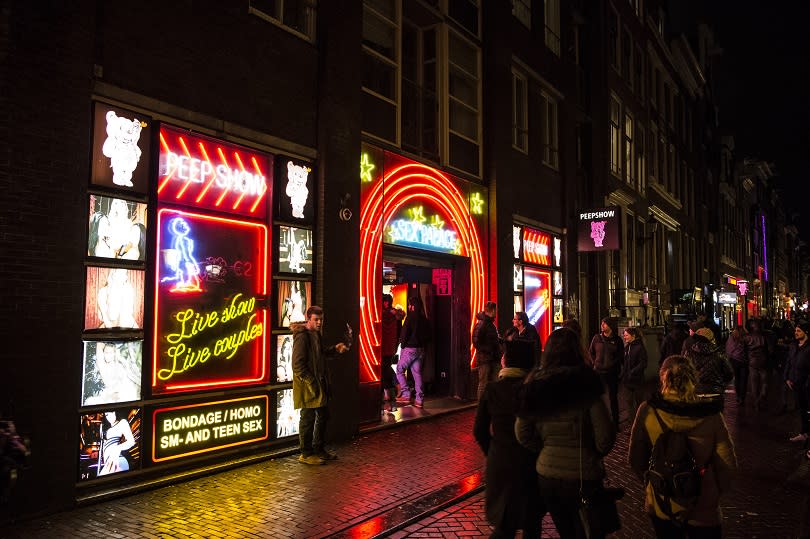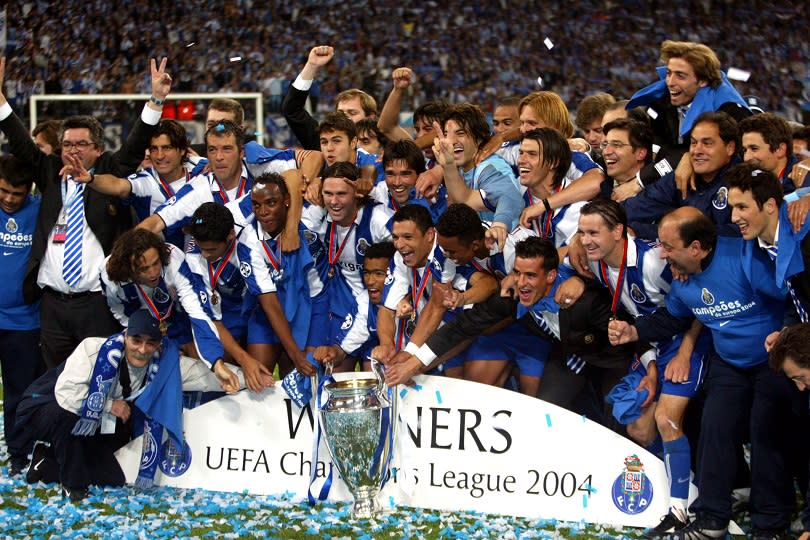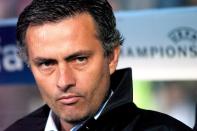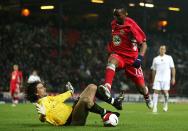Benni McCarthy, One-on-One: “I was heartbroken to score twice against Man United – and Mourinho hammered me for it”
Portrait: Chris Close
Images of South African striker Benedict Saul ‘Benni’ McCarthy wearing a kilt “the proper way” isn’t quite what we expected. But then the former striker has called Edinburgh home since retiring in 2013.
“I promised my wife we’d move here and it’s a beautiful place,” says Bafana Bafana’s all-time leading scorer, now 39 and an UEFA A-Licenced coach.
The 80-cap striker became the first South African to score in the World Cup finals and later the first to win the Champions League. McCarthy is in fine form over lunch with FFT on the historic George Street, as he recalls life growing up in a Cape Flats ghetto before playing in Holland, Spain, Portugal, England, South Africa again and, er, the Scottish Lowland Football League.
His isn’t a well-trodden path, but it’s one McCarthy is only too happy to recount.
What is your earliest football memory?
Elizabeth Morgan, Sittingbourne
Growing up in Hanover Park, Cape Town and playing in the gangster league. That helped turn me into the person and player I became. I was 12 and playing against grown men – that makes you grow up very quickly! Cape Town is full of gangs, but the violence stopped on a Sunday to make time for football.
On Monday it would resume. Huge tournaments took place; we called it ‘the Bundesliga’ because the ‘Bundes’ were blocks between the rival gang areas where nobody dared go. I played for the American gang – a wealthy gang because of the drug money. We wore Brazil’s kits and had players who played at a higher level. Tournaments would always be for money – and big money too. We’d share that out between the players.
Is it true that one of your school friends became one of the city’s biggest gangsters? Is he still alive? How did you keep out of trouble?
Nathan Simmons, via Twitter
It’s true. Gavin. He was my mate and in my class at school. He was bullied as a kid because he was small, quiet and a good-looking boy. I was the school’s soccer star and he hung out with me a bit to be on the safe side. At grade six [equivalent to year six] he grew quickly – and he wasn’t small anymore.
He started hanging out with the wrong crowd and became an infamous drug lord. I met his younger brother years later and he said: “Gavin tells all his friends about you; he’d love to see you.” I went to see him on my next trip to Cape Town. I was earning massive money as a footballer but I couldn’t afford the house that Gavin lived in. It was like something out of a movie: a mansion with rottweilers and bodyguards holding guns.
The skinny little lad had become the top dog. He was a friend, but their line of work had no place in my life – I don’t like to have to look over my shoulder.
I’ve read you were a petty thief on Cape Town trains as a kid. Is that true? Did you get into many scrapes?
Stanley Ward, Birmingham
I wasn’t a petty thief who took money from others, but I would steal apples from gardens and farms. We would catch trains to the farms and fill our bags with fruit. If you got caught then the farmers kicked your ass! They would put you in a room and hose you down. It was agony. They’d say: “Tell your friends this is what they get if they come to our farm!” I rarely got caught, though. I was too quick!
How did your move to Seven Stars come about? Were you already talked about as a hot prospect in South Africa?
Ryan Underwood, Lincoln
The manager of Seven Stars had two sons who played on the same pitches as Crusaders, my team. I played in an under-17s cup final and his sons had played before our game. He watched me score four goals in 15 minutes and stayed to watch more. Three days later, my brother and his best friends went to play indoor football with Seven Stars.
The manager came to pick up my brother and he saw me playing outside. He told my brother that he’d not been able to sleep for three days, wondering how he could trace me. Seven Stars were in the South African second division – between 5,000 and 6,000 would watch them play – and I went from playing amateur football to playing for them. The owner of the club was Rob Moore, who would become my manager.
How hard was it to adjust to the Eredivisie?
Craig Brock, Southampton
It was extremely tough. I’d come from an underprivileged area where only the strong survive, and entered a world where everything was well organised and done on time. In joining Ajax, I came from having no rules to being told exactly what to do.
How did you find Amsterdam as a city? Was it a culture shock, leaving South Africa to then have much more disposable income in Europe? What was your first impression of the infamous red light district?!
Felix Walton, via email
The food in Amsterdam was intriguing – I was used to my mum’s amazing chicken curry. In Holland there were dishes with names that scared me – and that was before I saw the food itself! I got used to it by programming myself to learn Dutch, out of respect to the people who were paying my wages [McCarthy speaks five languages]. They would see me talking in their language on television, and they liked that. I’d tell any player who moves to another country that they should learn the language and learn about the culture – it will save you.
As for the red light district... [laughs] Fascinating. My eyes popped out of my head looking at nearly-naked and beautiful women in the windows, who looked like they were from magazines. They were calling me! If you tried to speak to a woman in Cape Town they’d chase you away like a dog. And now these women wanted me as I stood in the street. It took me a while to get my head around that.
Amsterdam is a very cosmopolitan city. I loved it. I would walk the streets and get lost, yet it was always a very safe place. I’d smell marijuana coming from every building. I’d never touch it, though.
Some of Europe’s biggest clubs wanted you after a great season at Ajax. So why move to a middle-of-the-road La Liga club in Celta Vigo, and did you quickly regret living in Europe’s biggest fishing port?
Diego Garcia, Galicia
After establishing myself at Ajax, I felt ready to move on. My dream was to go to England. I could have gone to Tottenham but my agent persuaded me that Spain was the place with the best teams and the best lifestyle. I should have done more research. I didn’t realise how difficult it would be to learn Spanish, and not a single person spoke English at Celta.
I had to guess what people were saying to me, or what they wanted. I watched TV with my little book full of words and learned Spanish. My team-mates would teach me all the wrong things. They told me that the words for ‘good guy’ were ‘you motherfucker’. So for two weeks I was going up to people all over Vigo and calling them motherfuckers!
The lack of Spanish affected my game because I didn’t know what the manager wanted. I played off instinct and everyone had a go at me because I did the wrong things, but after eight months I could speak Spanish. As for Vigo being an ugly port, well... when I went to sign, they used an attractive translator to show me all the best bits of the city and the beaches full of half-naked girls. It was a beautiful sunny afternoon and I was thinking, ‘This is the life’.
Living in Vigo made me grow up. After costing the club so much money, I was under pressure to perform, and I got criticism at the start. I felt pressure for the first time in my life. But things worked out well and the Celta fans took a liking to me. Scoring goals against their rivals Deportivo and celebrating wildly helped a lot. I was told I should never step foot in La Coruna again. I have no intention of doing that when beautiful Vigo is next door.
You once said: “If you throw one punch at Jose Mourinho, he’ll throw two back at you.” Who would win in a fight: you or him? And was he the best coach you played under?
James Davis, London
If it’s physical then I would knock Mister out with one punch – no danger! In football terms, though, he’s Mike Tyson. I’d have no chance. He was the best coach I played under: the most skilled, intelligent and clued-up.
I’ll never forget your brace in the first leg of the 2003/04 Champions League last 16 tie against us [Manchester United]. The header, especially, was incredible. Even Fergie described it as “out of this world”. Was that the best game you ever played?
Ian Johnston, Manchester
I support Man United and always wanted to play for them. I loved players like Mark Hughes, Andy Cole and Ryan Giggs. So I was heartbroken to score twice. My dream was to score once at Old Trafford – not to knock United out. I got hammered by Jose Mourinho after the game because I wasn’t very happy. He told me that if I didn’t cheer up, I’d never play in his team again.
How did Mourinho mastermind the win over United? What did he say before the second leg at Old Trafford, and how did the team react when you went 1-0 down to fall behind on away goals?
Sean Warner, via email
He said to keep the shape, keep it tight and prevent them from scoring – because if they score, we’re screwed. But if they manage to break us down and score, that’s when we attack and play against them like we played in Porto. If they don’t score, a 0-0 draw suits us fine.
United scored and we crapped ourselves, but before they could attack us again, we went full steam ahead. I don’t think they’d been bullied like that. Ricardo Carvalho was exceptional; our defence was magnificent; Nuno Valente kept Ronaldo at bay. We’d done our job and United were out. It was a great night for Porto, but a mixed one for me.
What were the celebrations like after you won the Champions League? Did Jose join in, knowing he would be leaving for Chelsea immediately after the game? And was there any chance of you following him to Stamford Bridge?
Rob Cotton, London
It was the greatest moment of our careers, yet the celebrations were odd because Mourinho wasn’t there. He knew he was leaving for Chelsea; the club knew it, too. Crucially, so did the fans, which meant death threats for him. I thought he’d still celebrate, but I think Jose was worried about the safety of his family. He threw his medal into the crowd and simply came to us one-on-one, told us it had been a pleasure and said goodbye. He told a few of us that he wanted to take us with him.
How close were you to joining Everton after that Champions League victory? Is it true Porto blocked the move?
Gareth Mallarkey, Merseyside
I was close. My agent knew David Moyes and he said he was interested in me. I just needed to sign on the dotted line, but the new Porto manager wanted to keep me as I’d been the top scorer. It was ironic, because the new manager was my old manager from Celta Vigo (Victor Fernandez), and we’d fallen out: he called me a son of a bitch. If I had heard, I’d have smashed him.
At Porto we continued to have serious problems. At the start he tried to be friendly and we agreed to put our differences behind us, but the chemistry wasn’t there and the problems resurfaced.
Would it be fair to say you had wanted to play in the Premier League for a while before eventually joining Blackburn?
Shane Loughton, Blackburn
Yes, it was my dream to play in England; I would have chosen Everton over Real Madrid. Spanish football hadn’t existed in South Africa when I grew up. I had options or interest to join Manchester City, Middlesbrough, West Ham, Spurs and Liverpool, as well as Rangers in Scotland.
When none of them came off for various reasons, I felt I was cursed never to play in England. When Blackburn came in for me, I spoke to Mourinho at Chelsea. Porto refused to sell any players to Mourinho and he advised me: “Move to England, do well for a season and if you’re still the player I had at Porto, I’ll come and get you.” I did well for Blackburn, who got me for just £2.5m. Then they wouldn’t sell me to Chelsea.
You had a great first season at Blackburn, but then it went downhill. Why? Was the writing on the wall when Paul Ince arrived and you didn’t get much of a look in?
Robraf Melcer, via Twitter
After that Chelsea move fell through, my career went up in smoke. Paul Ince wasn’t a good manager for me. I think he had an issue that I’d done well playing for Mourinho – he used to make little digs.
Who’s the better player: Deco or Robbie Savage?
Edd Langton, via Twitter
[Laughs] They are two completely different players and it’s not really fair to compare them. Deco’s still my mate. He was a magician – he could do anything with a football. But he didn’t have the same work ethic that Savage had. Robbie had a very successful career in England and I really respect him for that.
How did it feel to miss out on the 2010 World Cup, given it was being staged in your home country? Do you think your off-field reputation went before you?
Matt Baldwin, via Twitter
I was gutted. It was the first World Cup in my country – the first in Africa – and I wasn’t there. Unfortunately, I had a love/hate relationship with the national team. There were too many club-versus-country battles and I was accused of not being patriotic.
But if I’d gone to play friendly games for the national team I could forget about playing for my club the following weekend. Clubs put pressure on me not to go, and I gave priority to the clubs who paid my wages every week. I wanted to play for both but it was impossible, and I was accused of turning my back on my country. People in South Africa had a grudge against me.
When it came to the World Cup, they knew they could hurt me by not selecting me. But I was still very proud of my country when it hosted the World Cup – relieved, too, because it staged a great World Cup.
What was it like to be fined for being “too fat”? Does it frustrate you that this is the perception of your time in British football?
James The Mackem, via Twitter
It frustrated me a lot. I was 85 kilos and fine at that weight; I scored a lot of goals at Blackburn at that weight [under Mark Hughes]. I had Sam Allardyce telling me I should be 80 kilos, but I wasn’t fat. I was 80 kilos when I joined Ajax as a kid – I was never going to be that weight 12 years later. Sam kept fining me because I was 84 or 83. He said I could be one of the best players if I was 80. He had it stuck in his mind that I should be 80.
Did you feel let down by West Ham, especially that they went to the media with the weight story? Do you have any regrets from your time at the club?
Keil Hampton, via Twitter
No, I have no regrets. West Ham is a great club with fantastic fans. I was going to join them from Porto in 2005. Everything had been agreed and I was even in London, sitting at Upton Park, ready to sign for Alan Pardew. Porto just needed to fax confirmation. Instead, they faxed that they didn’t want to sell me.
Do you stand by a quote of yours that I once saw, in which you said Karren Brady “is the devil with tits”? What do you think of her and the current ownership, in general?
Rudy Todd, London
[Laughs] West Ham are flying and Karren is part of that, so who am I to knock them? But she started throwing blows at me and I can step into the ring with anyone. I wasn’t going to stand there as she spanked me in public, so I hit back. Do I stand by what I said? Yes, I do.
How important was it to finish your career in South Africa, at Orlando Pirates? Is it true the fans nicknamed you Big Brother? Why?
Amber Pratt, Johannesburg
It felt right to finish my career where it all started. I felt that I played well and entertained people, and I was top scorer. We won trophies. It was a lot of fun. I’ve not heard ‘Big Brother’ before, but there are some great nicknames in South African football. We had a young player called ‘Grandpa’ in our team, but there are legendary names. One player was called ‘Dancing Shoes’.
You’re the top scorer in Bafana Bafana history. How much pride does that achievement give you?
Tom van der Meer, Pretoria
It gives me great satisfaction to have gone from a gangster ghetto to being my nation’s all-time top scorer. The first South African to score in the World Cup finals, to win the Champions League – it’s not a bad story to tell my grandkids, is it? I’m very proud.
You’ve been very outspoken about how European sides treat new arrivals from Africa. Is the current system working, or is it still failing young, vulnerable players? What is it you most object to?
Freddie Harvey, via email
Clubs have improved; they do try to protect their investments. It’s much easier for young African players now – the world has become smaller. But I’m still surprised that Celta Vigo paid so much money for me and then didn’t help me with a translator or help me with getting a house. I didn’t even know the word for estate agency. Blackburn were so professional in contrast, but I appreciate that I arrived for a big sum of money. It’s not the same for a lot of young African players.
Why are you living in Scotland?! Isn’t it a bit cold for someone born and raised in South Africa? Have you tried haggis, deep-fried Mars bars or Irn-Bru?
Jamie Robertson, Dundee
My wife wanted to live back in Edinburgh, where her parents live. I had to follow! She’d done enough travelling around with me. I tried the deep-fried Mars bar but it was too sweet for me. I do treat myself to one can of Irn-Bru a week, though. I love haggis and eat it all the time. But I don’t want to know what it’s made of!
Did you wear a kilt at your wedding? The proper way?
Gareth, Edinburgh
Yes, and yes [gets his phone out to proudly show photos to FFT]. I went commando.
How did your appearance for amateurs Whitehill Welfare come about? What was the standard like? Any desire to keep playing up here in Scotland?
Sam France, via Twitter
My wife’s sister’s husband plays for Whitehill Welfare and they had a shortage of players because they all went to T in the Park! A friendly against Hamilton had been arranged so I was asked to fill in. I scored and then other teams asked me to come out of retirement.
What plans do you have for the future? Do you want to stay in the game?
Jason Logan, Leeds
I want to stay in football. I love football. I want to give back to the game that gave me everything. Neil Lennon was very helpful to me when he was at Celtic and I used to go there and help out most days. He gave me the hunger to improve players, to work my way up and become a manager.
I learned a lot playing under Louis van Gaal, Jose Mourinho, Co Adriaanse, Mark Hughes and Sam Allardyce. I want to go into coaching and work my way up.
This feature originally appeared in the June 2015 issue of FourFourTwo. Subscribe!

 Yahoo Sport
Yahoo Sport 






































